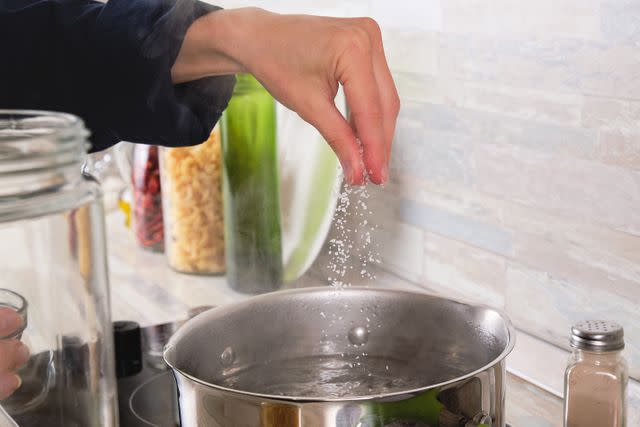Kosher Salt vs. Table Salt: An Expert Explains the Difference
A chef instructor taught me how to substitute one for the other.

Simply Recipes / Photo Illustration by Wanda Abraham / Getty Images
You've probably noticed that some recipes call for salt while others specifically call for kosher salt. Just salt likely means table salt, such as Morton Iodized Salt, while kosher salt will say—you guessed it—"kosher salt" on the label.
While you might be tempted to reach for whatever salt you have on hand, knowing the difference between table salt and kosher salt can be the difference between a well-seasoned meal and a salt lick.
To learn all about both types of salt, including when it's best to use each and how to correctly substitute for each other, I turned to a culinary professional: Olivia Roszkowski, a chef-instructor of Plant-Based Culinary Arts at the Institute of Culinary Education. Here's what I found out.
The Key Differences Between Table Salt and Kosher Salt
Additives: Nearly 70% of table salt in the United States is fortified with iodide, a necessary nutrient that's been added to salt since the 1920s to help prevent iodine deficiency, according to Global Health Now. The main kosher salt brands sold in the United States like Diamond Crystal and Morton are not iodized.
Table salt often has anti-caking agents such as tricalcium phosphate and stabilizers such as dextrose added. The additives in kosher salt vary by brand. For example, Diamond Crystal has no additives, while Morton Kosher Salt has the anti-caking agent yellow prussiate of soda.
Texture, grain size, and volume: While table salt has very fine grains, kosher salt has large flakes that take up more space. The difference in size and volume is perhaps the most important distinction between the two types of salt. If you are measuring by volume—using teaspoon measurers, for example—you'll get a lot more table salt than kosher salt.
Taste: While people often say that table salt tastes "saltier" than kosher salt, that's only true if you're measuring by volume, as noted above. If you measure out a teaspoon of table salt for a recipe, the dish will taste much saltier than if you measure a teaspoon of kosher salt.
Iodized salt can leave a slight aftertaste for some users, says Roszkowski, while kosher salt tastes cleaner to some loyalists.
Availability: While you can find table salt at even the most poorly stocked grocery store, you might have to hunt around a bit more to find kosher salt. Until Trader Joe's started selling Diamond Crystal—my favorite brand—I had resorted to buying it online because I couldn't find it at any of my local grocery stores in New York.
A note about low iodine diets
Simply being certified kosher doesn't mean a product is free of iodine, or that what's inside is what's commonly thought of as coarse kosher-style salt. Many different types of salt available in stores can be certified kosher and bear the certified kosher symbol on their label (iodized table salt, for instance). If you are following a low iodine diet, always verify on the label that the salt does not contain iodine.

Simply Recipes / Getty Images
When To Use Kosher Salt vs. Table Salt
"Kosher salt is a chef favorite because of the way you can easily grip it in your hands—with this built-in control, it is easier to season food more evenly," Roszkowski says. "When seasoning a large piece of protein, chefs prefer using kosher salt because of its large, uniform crystals that generally dissolve quicker and can help tenderize the protein in the process."
So when you want to salt something "like the sidewalk," in the words of Sydney on The Bear, grab that box of kosher salt.
Kosher salt is also great for rimming cocktail glasses and instead of flaky sea salt as a garnish. Finally, "Kosher salt is good to use when you feel like you have the tendency to over salt something," Roszkowski adds.
Table salt (as well as fine sea salt) tends to dissolve quickly, making it good for marinades, brines, and baking.
How To Substitute Table Salt for Kosher Salt
Because table salt is "saltier" than kosher salt by volume, the best way to substitute table salt for kosher salt and vice versa is to weigh it instead of measuring by volume. Measuring by weight is a good idea even if you are using the type of salt called for in the recipe, since even among the same type of salt, one can be saltier by volume than the other. For example Morton kosher salt is saltier by volume than Diamond Crystal.
If you don't have a kitchen scale or don't feel like weighing your salt, a good rule of thumb is to substitute half the amount of table salt with kosher salt. Conversely, if the recipe calls for regular salt, increase the amount of kosher salt by as much as double if you are using Diamond Crystal. If you are using Morton Kosher Salt, I recommend using about 1 1/2 teaspoons of Morton Kosher for each teaspoon of table salt called for in the recipe.
The Takeaway
Kosher salt and table salt have different textures and crystal sizes, which means you have to be careful substituting one for the other in recipes. But in a pinch, you can use half the amount of table salt in a recipe that calls for kosher salt—taste as you go and adjust until you reach salt perfection!
Read More: The Best Salts for Cooking
Read the original article on SIMPLYRECIPES


